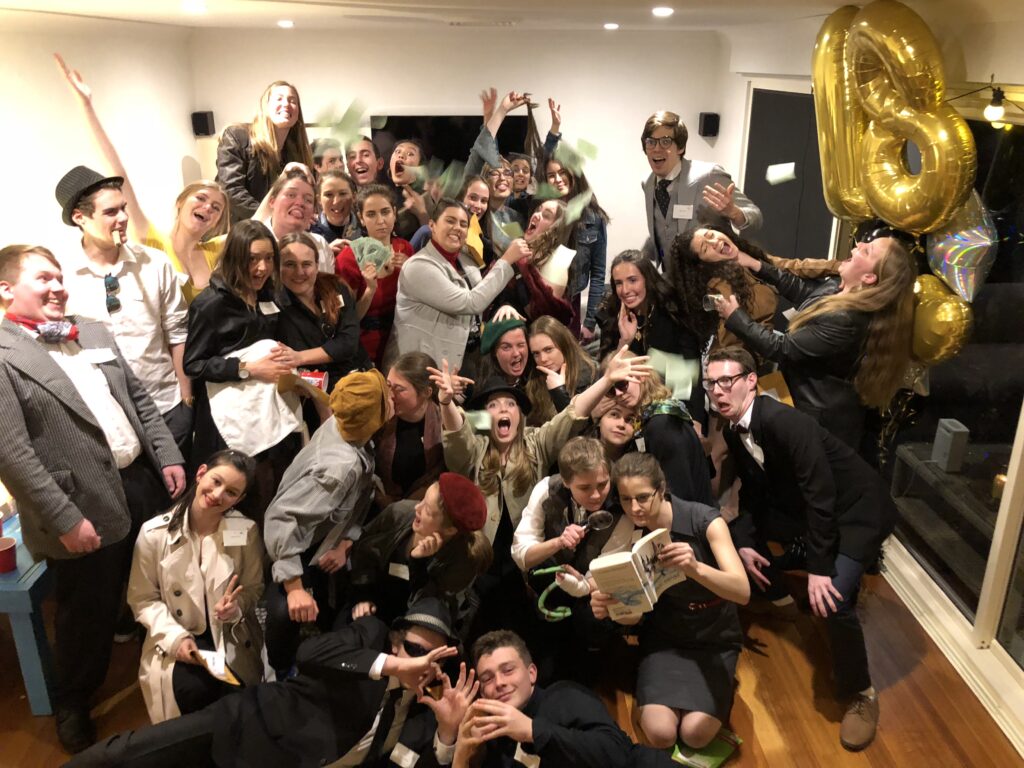Murder mystery FAQs
We appreciate that there’s lots murder mystery games out there, and it’s hard to tell the quality of them apart. So we’ve put together some questions you should be asking when choosing a murder mystery game.
Note: Other providers may use different terms, or, more often than not, no terms at all to describe their game.
Preallocated means people get their character before arriving. This allows them to dress up as specific characters. It means you may need to reassign characters if people don’t show up.
Post-allocated means people get their character after arriving. This means people can dress for the theme, but not as specific characters. It means you don’t need to coordinate who is playing who ahead of time, and there’s no problems if people don’t show up.
VIP Mystery™ games are both. We’ll send you a list of characters when you book. If anyone/everyone shows up to the event without a character, we’ll allocate them one. Or if someone doesn’t show up, you’re not required to reassign characters. Just play! Easy.
VIP Mystery™ games do not require you to send or memorise names, descriptions, or instructions.
You can make up your own name and backstory.On the night you’ll get an opportunity to earn rewards for revealing your name and backstory.
You’re welcome to come prepared as an existing celebrity, or your own original character, or just make one up on the night!
As an additional service, we can write you entirely bespoke roles, character names, costume suggestions, and backstories, including injokes based upon your guest’s real names and lives.
Scripted means players must do or read certain things to certain people. If they don’t, the mystery may be unsolvable. Scripted games may still have unscripted segments where people discuss their ideas. In general, scripted games feel more like a live reading of a movie script.
Interactive means players do and reveal as much as they please. It’s often up to players to coerce others into revealing what they know. Interactive games may still have scripted moments, like the MC’s speeches, to ensure that everyone has critical information. In general, scripted games feel more like solving a real crime.
VIP Mystery™ games are interactive. We don’t want you to feel like you’re at a script reading, or that you have a laundry list of conversations to have. You can say what you want, with who you want, just like in a real murder mystery. Only the MC has scripted dialogue: an opening address (explaining the game) and closing address (that reveals the answers).
Total amnesia means that players know nothing that the characters they’re playing would know.
Solution amnesia means everyone knows everything their character knows, except the murderer doesn’t remember they’ve done it. So the murderer will attempt to solve the crime like everyone else. Players can interrogate each other for information, but they must also suspect themselves of commiting the crime.
No amnesia means everyone knows everything their character knows. Players can interrogate each other for information, and a murderer will attempt to deceive other players.
VIP Mystery™ games have no amnesia. We believe the quintesential murder mystery experience is being able to question each other, and the murderer(s) attempting to decieve you, like in a real murder mystery.
Premortem means that the murder will occur during the event. This often means:
- – People must avoid mentioning it’s murder mystery until the murder occurs
– The MC must secretly brief a victim on when and how to die, and how to rejoin the party via “ressurection” or by returning as another character
– People have total amnesia, or “suddenly remember” (get handouts about) what they know about the murder
– Either:
1) the circumstances of the death are more mundane, e.g. poison, or
2) the story requires a heavy suspension of disbelief. - E.g. Players see the victim hanging out at the party for 30 minutes and suddenly falling the floor, but the story says the victim was missing for 30 minutes and then found soaking wet, dismembered by sharks.
Postmortem means that the murder occured before your event. This often means:
– People can acknowledge they’re at a murder mystery event
– Nobody needs to rehearse how to play the victim
– People can start with detailed knowledge about the circumstance of the crime
– The circumstances of the death can be more interesting or realistic, without requiring the suspension of disbelief
VIP Mystery™ games are postmortem. We find this is more intuitive to play, interesting to solve, easier to run, and less awkward to partake in.
However, we know that having someone die at your party can be fun. At additional expense, our VIP Mystery™ games can be expanded to allow players to kill each other, so you can have additional deaths at your event!
Throughout your party your MC may run events to reward players. There can be:
No minigames. Players are totally left to generate their own fun. There may still be announcements like evidence being revealed for all to see.
Party minigames. The MC will run classic party games that would occur a non-murder mystery party, like charades, ‘Bang!’, musical chairs, limbo, and trivia.
Role playing minigames. These are “minigames” that could only happen at a murder mystery, like having people introduce themselves in character, having people pitch their character’s ideas to the group, or an auction of the deceased’s estate.
VIP Mystery™ games suit any style; the deceased’s will stipulates money can be given to people who act in the deceased’s image. Whether they were someone who enjoyed party games, or role playing is up to you. We recommend role playing minigames (since you can play party games at any other event!) but we trust you and our professional MCs to pick what’s best for your event.
Clues come in two varieties:
Story chunks are printed segments of the story, as if the murder was witnessed by a omnipotent narrator. They tell players what the story is. Solving the mystery often requires getting the right 1-2 slips of paper, which aren’t handed out until the final moments of the event.
E.g. A slip of paper that says “The chef was hiding behind the pot plant with a knife, when the victim entered” or “The victim was murdered by someone hiding behind the pot plant.”
Evidence are items that you could find while investigating a real crime scene. Solving the mystery often requires people to use deduction, like in real life.
E.g. A signed will, a knife coated in blood, or a photo of the crime scene.
VIP Mystery™ games only use evidence. We believe the quintessential murder mystery experience is deducing things for yourself, like in a real mystery.
Team means people play and win as teams. It varies greatly from provider to provider, but there’s a trend in the industry for group games to also:
– have quick setup
– work for huge groups
– post-allocate characters
– have total amnesia, so people can’t interrogate each other
– include party minigames
– use story chunks for clues
Individual means people play and win as individuals. It varies greatly from provider to provider, but there’s a trend in the industry for individual games to also:
- – have more complex setup
– be limited to smaller numbers of people
– preallocate characters
– have no amnesia, so people can interrogate each other
– include role playing minigames
– use only evidence for clues
– give every character a unique description and a backstory with 2-6 other characters
– have unique physical props
VIP Mystery™ games are team games. Unlike other team games we have all the benefits of team games:
– have quick setup
– work for huge groups
– post-allocate characters
PLUS the benefits of individual games:
– have no amnesia, so people can interrogate each other
– can include role playing and/or party minigames
– can be preallocated
– can be run so there’s an individual winner
At an additional cost, we can add unique physical props, and give every character a unique description and a backstory with 2-6 other characters so that you have the ultimate murder mystery kit.
Judged games have their winners decided by a judge. E.g. Everyone gets to tell their version of the final story, and the MC picks the story they think is the best.
Objective games are won by measurable means. E.g. The team with the most money, or every team who accuses the right person.
VIP Mystery™ games are objective. Players earn money throughout the night for role playing and/or winning party games, and a huge amount of money for solving the murder. The team with the most money wins. Not only is this more transparent and fair, but it means people are incentivised to make the event more fun, not just to get the right answer.
Rounds are when games are split into repeated sections. Generally a game with rounds:
– Has three, one hour rounds
– Starts every round with a scripted event
– Ends every round with an accusation minigame
– Doesn’t reveal vital clues until the final round
– Keeps players on a reliable “rollercoaster” of emotion
No rounds generally means a game:
– Has flexible timings
– Has flexible choices of minigames and events
– Has vital clues available from the start
– Allows expert detectives to solve the mystery faster
VIP Mystery™ games have no rounds. This means we have flexible timings, can offer more variety in minigames and events, and the work you put into solving the mystery isn’t discarded when a new round of clues is revealed. We let expert detectives to solve the mystery as fast as they can, and add additional mysteries to solve if there’s time.
Every murder mystery has a murder, but some games also allow players to kill (eliminate) people of their choice. This might be an ability only some characters start with, or an ability anyone can earn by finding the right items.
No elimination means players cannot eliminate each other. The only death is the one in the story.
Soft elimination means that if their character dies, players return as another character, or are “ressurected”, so they can still win.
Effective elimination means that if their character dies, players can return to continue playing, but they can’t win.
True elimination means that if their character dies, players can no longer interact with other players. People who die must pretend to be a corpse, or leave the game area entirely. True elimination is good for short games (1-30 minutes), and hardcore roleplaying enthusiasts.
VIP Mystery™ games have no elimination by default, but in-person games can include elimination at an additional fee. We recommend soft elimination for extra fun. We only recommend effective/true elimination for masochists and hardcore roleplaying enthusiasts.
Murder mystery role playing games are social events where guests play characters in the story. Generally they:
– Focus on socialising.
– Have an MC.
– Eventually reveal the murderer is a player.
– Are for 6+ people.
– Have players or teams competing.
– Are solved by interrogating other players and using information revealed by the MC.
– Have minigames (which can include a treasure hunt)
– Can be run over food.
– End at a predetermined time.
Murder mystery puzzles are mailed packages / escape rooms / outdoor hunts where guests don’t play characters in the story. Generally they:
– Focus on puzzle solving.
– Don’t have an MC, but may have actors play characters in the story.
– Eventually reveal the murderer isn’t a player.
– Are for 1-5 people.
– Have players working together.
– Are solved by following a chain of clues.
– Have no minigames.
– Aren’t run over food.
– End at a predetermined time, or end early if you solve the mystery early.
Murder mystery dinner theatres are ticketed theatre shows that often include a meal. They are not games, but may include audience interaction.
Jubensha are a type of murder mystery role playing game that are only available at an escape-room-like venue. They mix role playing and escape rooms.
VIP Mystery™ games are murder mystery role playing games. This allows people to act in character and socialise.

VIP Mystery™ FAQs
There is no maximum.
Either.
There are six guilds in every story. Guild members know the same starting information about the murder, including whether their guild commited a crime.
E.g. The Action Film Star and Standup Comedian are in the Acting Guild. They both know their guild attempted to electrocute the victim.
For teams: Each team plays one guild. The team with the most money at the end of the game wins.
For individuals: Players pick whatever character they want. Players in the same guild start with the same information, but once the game begins everyone plays by themselves. The person with the most money at the end wins.
Yes!
These are set in stone:
– your profession
– your guild
– what guilds did on the day of the murder
The rest is open to improvisation. You’re welcome to create your own:
– name
– nationality
– accent
– personality
– backstory
– relationship to the deceased
– relationship to other players’ characters
– goals
In-person
If you’re in-person, we recommend something happens every 30 minutes. Meals can fit in between at the quarter hour marks.
-0:30 Host arrives
0:00 Guests arrive, get game materials
0:30 Grand introduction (0:40 Break)
1:00 Event (1:10 Break)
1:30 Event (1:40 Break)
2:00 Event (2:10 Break)
2:30 Grand finale (2:40 Break)
3:00 Host departs
Online
If you’re online, we recommend something happens every 20 minutes.
(Prior) Guests get emails with game materials
-0:20 Host arrives
0:00 Guests arrive
0:20 Opening announcement (0:30 Breakout rooms)
0:40 Event (0:50 Breakout rooms)
1:00 Event (1:10 Breakout rooms)
1:20 Event (1:30 Breakout rooms)
1:40 Grand finale
2:00 Host departs
Yes. People can share a computer.
But we recommend anyone sharing a computer is on the same team. If people on opposite teams share a computer, they won’t be able to secretly coordinate with their team.
We also recommend that if you use a seperate computer, you use a seperate room. We often get background noise issues when people on seperate computers are calling from the same room.
Yes, but you will need to print out some items like name tags.

